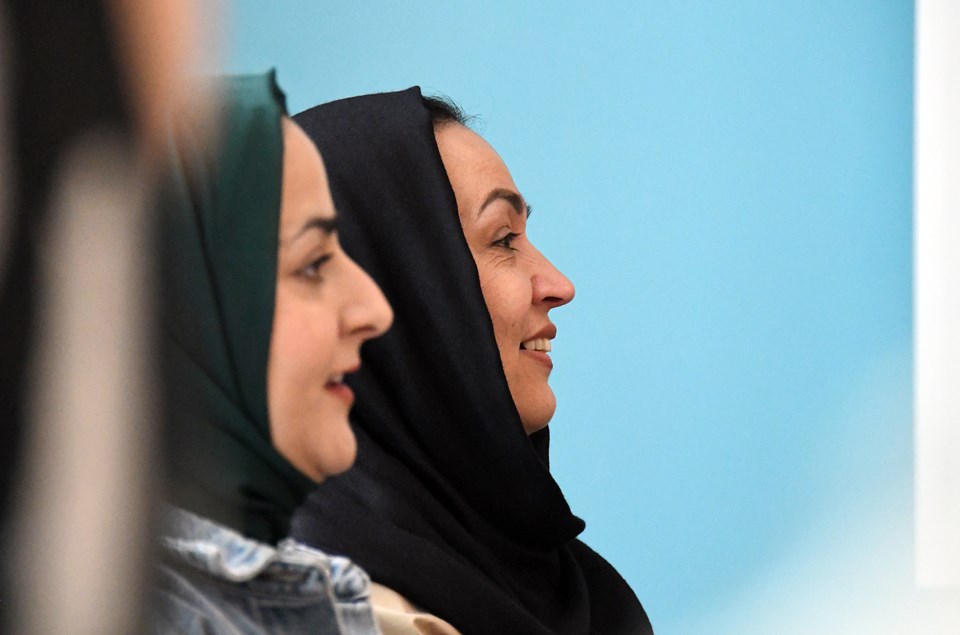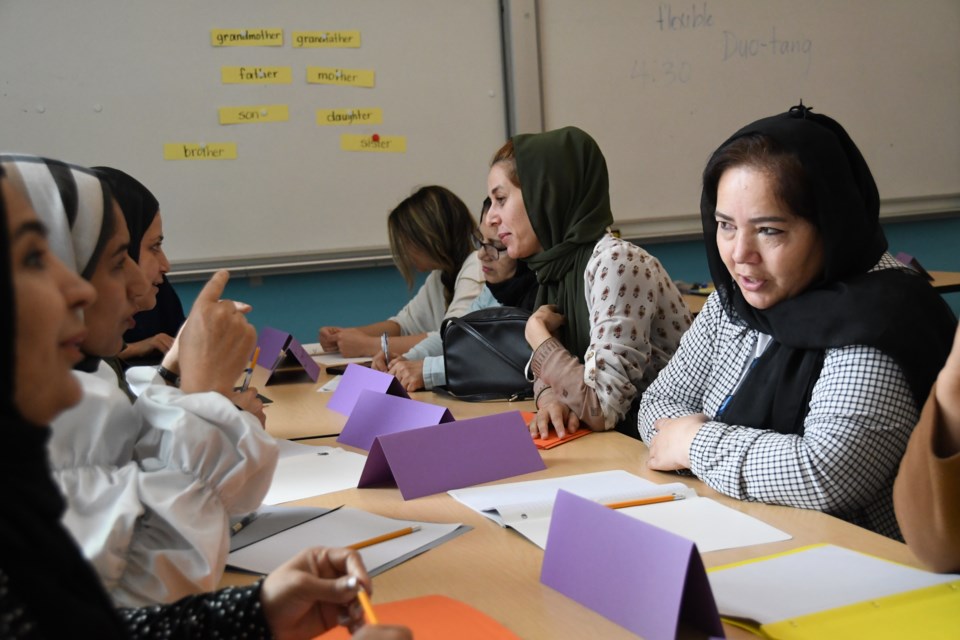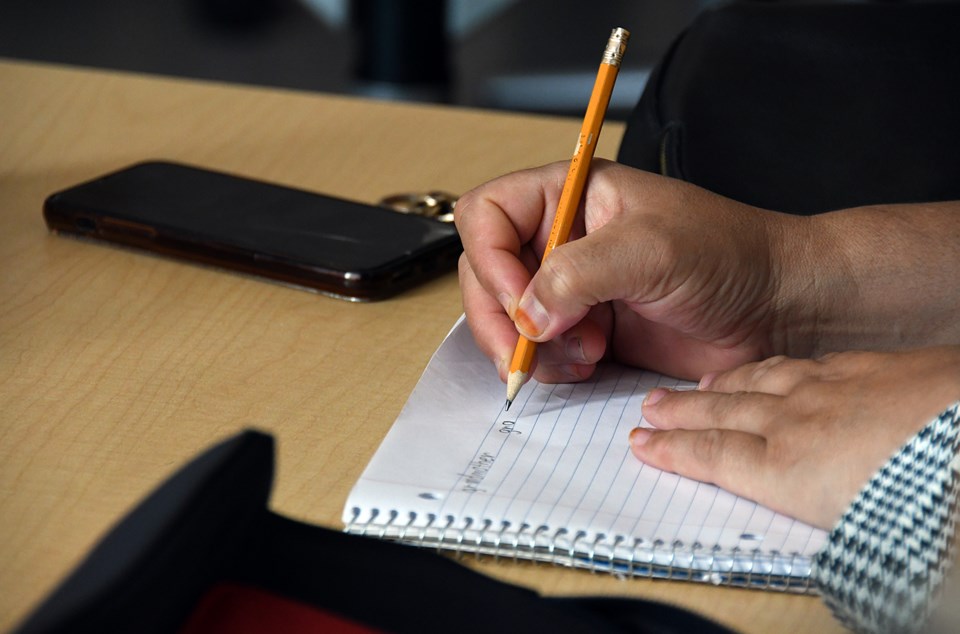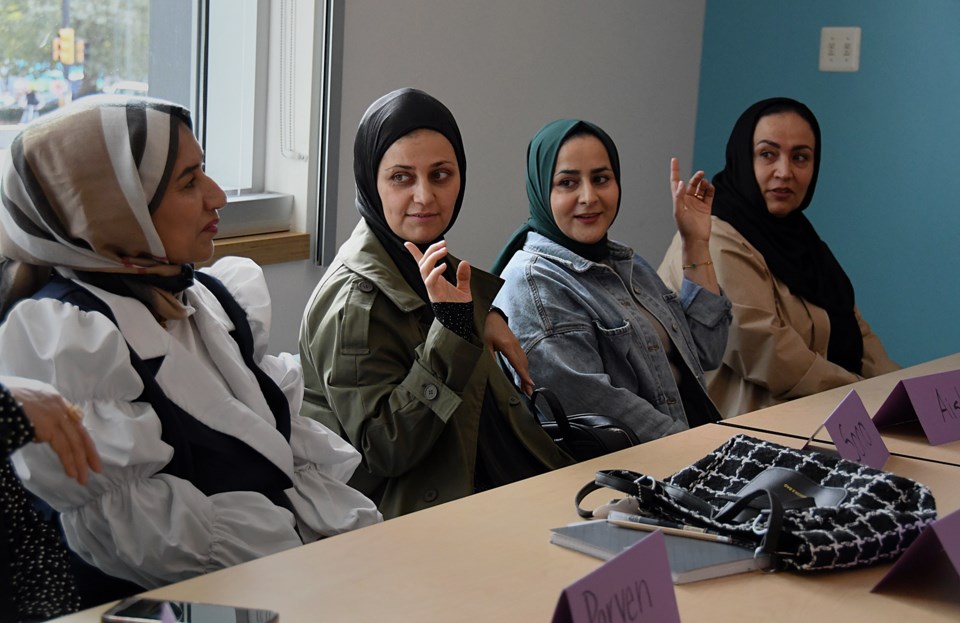Building a new life in Canada after fleeing the Taliban is still a struggle for many Afghan women, but a new women’s-only English class at Burnaby Public Library is there to help.
Every Sunday morning, nearly 30 Afghan women gather in one of the community rooms at the Tommy Douglas branch in the heart of the Edmonds neighbourhood.
The free class, which launched in mid-September, is part of a myriad of services and supports for newcomers and refugees developed by the Burnaby school district's federally funded Settlement Workers in Schools (SWIS) program.
Along with English language learning, the class is a chance for the women to make connections with others facing the same challenges.
"We have lots of sorrows," said Hasina Ahmadzai who fled her home country in August 2021, when it fell to the Taliban. "We share our sorrows and we are happy. Afghans do not have any other assets except their friends."
'We are safe'
When the Taliban took over, the women and their families had to leave behind everything, including rewarding jobs, according to Gulalai Akbari, who served in Afghanistan's national assembly for 16 years.
(Ahmadzai had to abandon her career as a high school principal.)
"One thing, we are safe, and it's a big thing, of course," Akbari said, "but if we compare it with our life back in Afghanistan, it is very hard for us."
Unemployment and the language barrier are among the most difficult challenges, she said.
The new class is a much needed opportunity to learn and practice English and has proved popular.
It was originally supposed to be capped at 17, but has expanded to 27, and still some women have had to be turned away, according to retired French immersion teacher Gudrun Susanne Howard, who has volunteered to teach it.
Howard said her own parents were displaced from their homes in Latvia by the Second World War, and her heart goes out to refugees.
"It's a pleasure to feel useful in this way," she said.
'A lot of charades'
Howard doesn't speak Dari or Pashto, the two main languages spoken in Afghanistan, but she has plenty of experience immersing students in a new language without help from a language they know.
"It's an opportunity to be creative," she said. "A lot of charades, a lot of drama going on, lots of visuals, lots of picture cards."
She began the class by talking about family.
"Oftentimes that's where you start when you're teaching a foreign language, what they know," Howard said. "We all have family."

Somehow the conversation ended up on the topic of shoes, she said, and the class had an impromptu "fashion show" where the women showed each other their footwear and learned words for colours and kinds of shoes.
There is a wide range of English proficiency in the class, which includes women still in their teens as well as grandmothers, and Howard had the students split into two groups during a session in early October.
The group totally new to English worked on numbers – rolling dice, counting in English and practising writing the figures in a notebook.
Those with a little more English were tasked with finding someone in the group they didn't know, interviewing them and then introducing them to the group – all in English only.
Afghan newcomers still arriving
Afghan newcomers and refugees now represent the largest group of clients the school district's SWIS program serves, with 424 students at Burnaby schools this September, up from 305 last year, according to co-ordinator Natalya Khan.
"They are still arriving," she told the NOW.
But, as the women's English class shows, the program doesn't just support kids; it offers settlement services to their families as well.
During its last fiscal year, which runs from April to March, the program provided services to 434 Afghan newcomers and refugees.
In just the first five months of this year, that number is already at 556.
So far, however, the program has only one worker, Mujeeb Khalvatgar, who speaks both of Dari and Pashto.
Symbolic significance
Once a prominent journalist and free-speech advocate in his home country, Khalvatgar was also forced to flee when Kabul fell to the Taliban in August 2021.
He said the new English class has been well received because it gives women the chance to learn English and to get together.
"I receive feedback that they are very happy because of those two things," he said.
In Afghanistan, women live in close community, and those who've been forced to flee have lost those ties, according to Khalvatgar.
"In Canada, when they are coming in, there is no person to talk with," he said.
That the class is meeting that need is borne out by the big smiles on the women's faces as they enter the classroom and greet the other women who are already there – regardless of whether or not Howard has already started the lesson.
For Khalvatgar, there is also another reason the class is important – a symbolic one.
Since its takeover, the Taliban has clawed back the rights of women and girls in his home country, including a new set of laws announced in August that prohibit women's voices from being heard in public.
The new class shows that the women who have fled persecution at the hands of the fundamentalist government have not been silenced, according to Khalvatgar.
"There is a law in Afghanistan that women are not allowed to talk or to speak outside," he said. "And now they are coming and learning English here in a public library."
Follow Cornelia Naylor on X/Twitter @CorNaylor
Email [email protected]





